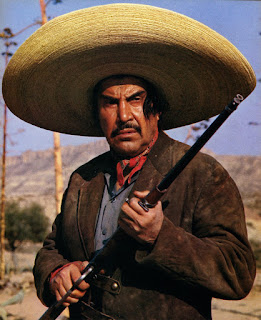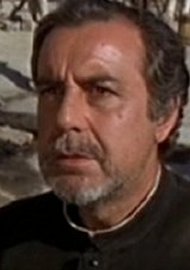The not quite so magnificent seven return
It was a Mirisch production, and UA knew how to milk a franchise, so despite a low budget the picture was in Panavision and Color De Luxe and shot by the talented Paul Vogel. Burt Kennedy directed and he’d come from the critical and box-office success of The Rounders at Metro the year before. And they used the same Elmer Bernstein music as in the 1960 picture. So Return had a fair bit going for it.
But it was shot in Spain, Alicante locations being cheaper than Mexican ones, I guess (certainly there were fewer censorship problems) and the script was not created by Walter Bernstein, Walter Newman or William Roberts, as the original had been, nor by Kennedy himself (who might have done a good job) but by Larry Cohen, best known for low-budget horror flicks and blaxploitation pictures. Cohen wrote five big-screen Westerns, none of them very special. There are a few good lines in Return of the Seven, but the screenplay has little of the magic we remember so fondly.
One thing we can say: Return of the Seven was the best of the sequels, which were of ever-diminishing quality, at least until the 2016 remake. It got less than ecstatic reviews but earned $1.6 million when it came out and another $1.3 million on its 1969 re-release (when the word Magnificent was added to the title, probably hyperbolically), so that wasn’t too bad. Kennedy himself said, “It was all right. We didn’t have much of a budget or any big-name actors except Yul Brynner, but it was all right.”
In the first reel some Mexican bandits led by the feared Lorca (the great El Indio, Emilio Fernandez) and his chief henchman Lopez (Rudy Acosta) raid a village. We are supposed to recognize the village, though it has been teleported to Spain. A man gets a gun from a chest and rushes out. It’s Chico, of course, but this time played by Julián Mateos, slightly more genuinely Mexican than Horst Buchholz. But he is grabbed and taken away, like all the other menfolk of the village. We shall learn why later. His wife Petra (a different Petra, Elisa Montes) is distraught, and sends a boy to find Chris.
Now we see a bullfight (unfortunately) and Chris is watching it. When Vin comes up Chris doesn’t say, “You look oddly different, Vin”. Though Vin does. He’s even dyed his hair. It’s Robert Fuller, you see, who took the role McQueen didn’t want. Fuller had finished at this time with both Laramie and Wagon Train, so I suppose he was once more a gun for hire. He’d done three big-screen Westerns before this one, with small roles, but this was the first in which he had co-starred. He doesn’t try for the folksy Vin McQueen did, and he certainly doesn’t try any antics to draw the limelight. He would never have got away with it. He’s OK, I guess. He talks about the role on a YouTube video, here, if you’re interested. “I had the best time of my life for three months with Yul,” he says.
Once he learns from the boy the story, Chris goes to the local prison where he bribes the guard to release into his custody Frank (Claude Akins) and a certain Luis Delgado (Portuguese actor Virgilio Texeira). So that’s four already – Chris, Vin, Frank and Luis. Then they see the gabby Colbee (everyone knows Chris, and vice versa) being defenestrated. It’s Warren Oates, a serial philanderer who needs to get out of Dodge fast (or out of this Mexican town anyway) to avoid irate husbands, so that’s five.
And now, as if the bullfight wasn’t bad enough, we have another horrible animal encounter, a cockfight. And there they recruit Manuel (‘introducing’ Jordan Christopher, in his only Western), who will make six, and with Chico, when they find him, that will be seven. So the recruitment process is all completed in a matter of a few minutes this time.
Unfortunately, the characters of the seven are not so charismatic, distinct or memorable as they were first time, nor are they developed much as the movie progresses. It’s all OK but slightly less then magnificent. Still, they gallop over bits of Spain to the strains of Elmer Bernstein.
Yul has a two-gun rig, this time, I note. Otherwise his costume is the same though.
The village has got a full-time priest now, and it’s Fernando Rey, and he seems to be more or less in charge. He tells the compadres that the wicked Lorca has taken all the men as slave labor to build a mausoleum for his fine sons who died fighting (actually they were lowlifes). Lorca’s obsessed with this project. It’s all he cares about.
Chris rides calmly into the building site where the men are working and talks to Lorca. “You spared my life once,” Chris tells him. Is this supposed to be Calvera returned from the grave then? No, it can’t be. Chris must have had his life spared by numerous Mexican bandits. Chris & Co get away from there (Winchesters help) and go back to the village.
Well, once again they start building walls and so forth, to defend the place from the coming attack. They were used to this by now. Lorca duly assaults the place, wearing the most splendid hat and liberally shouting one of his few lines, the classic “Vamonos, muchachos!”
Chris decides to take the attack to the foe, and the showdown nears (it’s a shorter film than the 1960 one). One by one the seven are whittled down, though we care less than we did about who dies because the characters haven’t really been defined. The same ones survive as did before (that’s probably not a spoiler) though I thought Chico’s fate was a cop-out. Perhaps Walter Mirisch already had his sights set on Mag Seven 3.
Sadly, that one, Guns of the Magnificent Seven in 1969, would be worse. I might say even worse, though on balance I tend to agree with Burt Kennedy’s own assessment of Return of the Seven, it was all right. But when you make a sequel, almost a remake, of such a truly great Western as John Sturges’s original, praise be unto it, you are almost doomed to failure from the start, Burt. Sorry.













6 Responses
When this movie was shown on television, it was preceded by a disclaimer that all the characters were fictitious. I never saw this message with any other movie shown on that network. Someone must have made them nervous.
Richard
Who do you think the characters might have been taken for? I wonder.
Jeff
I know that some Hispanic rights groups complained about Mexicans being portrayed as banditos or other villains. Perhaps they were trying to forestall any protest.
Richard
Jeff, another good write-up. I remember first seeing the RETURN OF THE SEVEN on NBC's SATURDAY NIGHT AT THE MOVIES in 1970. That was almost 50 years ago, but I don't recall a disclaimer preceding the showing that I saw, although the government of Mexico deemed the script for the original THE MAGNIFICENT SEVEN(1960) anti-Mexican. I do remember that CBS had producer Norman Lear place a disclaimer before the first showing of ALL IN THE FAMILY in January, 1971 for mature subject material.
Claiming that the characters in a Western like RETURN OF THE SEVEN are fictitious does rather seem like stating the obvious…
Jeff
If they would have just made up a new character for Robert Fuller, instead of trying to pass him off as Vin, this movie might be a little bit more liked. To me that's the worst part of it. Otherwise, I enjoyed it thanks to Warren Oates and Claude Akins. I thought the Akins character was interesting.